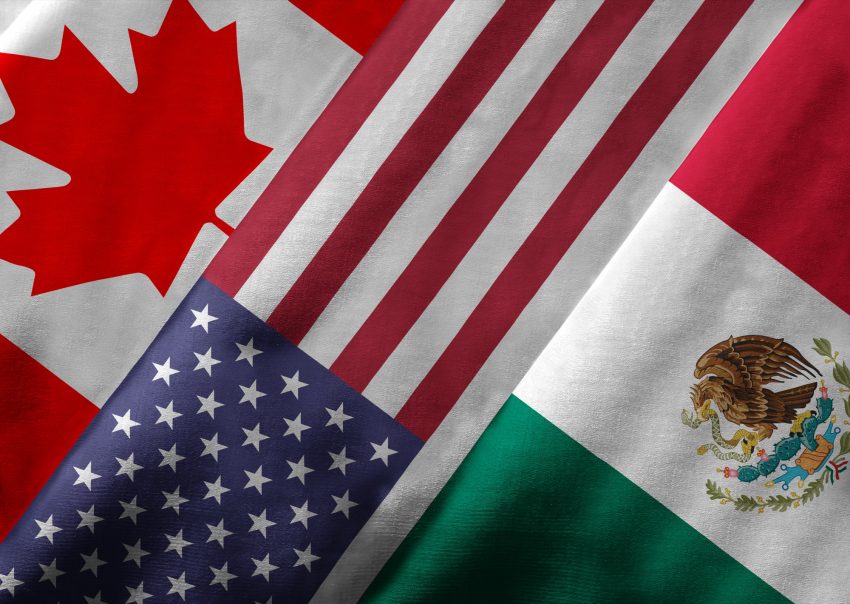On Monday, the United States and Mexico reached a new pact on a revised North American Free Trade Agreement (NAFTA). The new deal does not include Canada, thereby putting a significant amount of pressure on the nation’s leaders to agree to the new terms on auto trade and dispute settlement rules if it wishes to remain part of the three-nation entente.
Negotiations among the three nations have dragged on for over a year without a definitive agreement. At stake is mutual trade of the three member nations, which totals over $1.2 trillion a year. Until this week, the inconclusive nature of the talks have put pressure on the Mexico peso and the Canadian dollar.
Trump’s Fighting Words
President Trump had some fighting words to share on Monday, stating that he could very well continue with a bilateral deal with Mexico, leave Canada out of the equation, and tax Canadian imports if it did not accept the new trade terms. The words resonated with Canadian officials, who seemingly instantly sprung to action in commencing negotiations.
Trump also let it be known that he expected concessions from Canada on various fronts, including dairy protections.
“I think with Canada, frankly, the easiest we can do is to tariff their cars coming in”, said the president. “It’s a tremendous amount of money and it’s a very simple negotiation. It could end in one day and we take in a lot of money the following day.”
Many economists and observes believe it will be extremely difficult for Canada to win concessions from the U.S. at this point.
Mexico Feels Secure
At a news conference in Washington, Mexican Foreign Minister Luis Videgaray was quoted as saying that if Canada and the United States do not reach an agreement on NAFTA, then “there will still be a deal between Mexico and the United States.”
Hence, Mexico is in a very secure position, having reached its agreement with the U.S.
High Political Stakes
The political surrounding revised NAFTA terms are significant for all three countries.
For the U.S., Republicans in the U.S. Congress will be up for re-election in November, and they are under pressure to make sure that stakeholders whose jobs depend on trade with Canada and Mexico, particularly farmers, that a deal has been reached, thereby removing significant levels of uncertainty.
For Mexico, President Enrique Peña Nieto is looking to have an agreement take effect before leaving office at the end of November.
In Canada, Prime Minister Justin Trudeau is up for a national election around the October 2019 timeframe.
A New Chapter In Negotiations
In a statement announcing the new bilateral deal with Mexico on Monday, the White House stated that Trump and Trudeau discussed trade in a phone call that day, and that both parties “agreed to continue productive conversations.”
After being excluded from talks for over two months, Canadian Foreign Minister Chrystia Freeland traveled to Washington on Tuesday and met with U.S. and Mexican officials that evening. She commended the concessions made by Mexico on autos and labor rights, adding that Mexico’s “difficult” concessions to the United States would enable productive talks this week. She is expected to hold detailed discussions with U.S. Trade Representative Robert Lighthizer on Wednesday.
“These concessions are really going to be important for workers in Canada and the United States,” she told reporters after meeting with Lighthizer.
Prior to the meeting, however, he spokesperson said that Canada would only sign a new agreement if it’s good for the country. Despite some of the hard talk, Freeland will be under significant pressure to accept the terms of the U.S.-Mexico agreement.
Trump’s economic adviser, Larry Kudlow, was quoted as saying that the new deal with Mexico should “reset” talks with Canada.
Luis Videgaray, Mexico’s Foreign Minister, was quoted on Tuesday as saying that the three parties are still in it for a three-way deal, and that long hours will be dedicated towards reaching an accord with Canada.
Trudeau’s office said that the prime minister spoke to Peña Nieto on Sunday, and both leaders expressed their commitment to reaching a successful conclusion of NAFTA for all three parties.
Sticking Points
One of the primary areas of contention for Canada in the new agreement is a USA-led initiative to remove the Chapter 19 dispute resolution mechanism, which obstructs the United States from pursuing anti-dumping and anti-subsidy cases. According to Lighthizer, Mexico had agreed to eliminate the stipulation.
Other sticking points include intellectual property rights on at least two fronts, including:
- 10-year data exclusivity for biologic drug makers
- A lengthening of copyright protections from 50 years to 75
Both are higher thresholds than Canada had backed in the past.
Congressional Feedback
A few Republicans in Congress called the bilateral deal with Mexico a welcome step, but warned that Canada must be part of the new agreement.
Friday Deadline
The deadline to modernize the 24-year-old North American Free Trade Agreement is this Friday, August 31st. If talks are not concluded by the end of the week, Trump has stated that he will move forward with the bilateral deal with Mexico.
The New Deal
The new bilateral NAFTA agreement between Mexico and the United States calls for 75 percent of automotive content (parts) to be made in the NAFTA region, up from the current requirement of 62.5 percent. The requirement is expected to shift production of some automotive parts to Mexico from China.
In addition, the revised deal requires 40 to 45 percent of auto content to be made by workers earning at least $16 per hour. The move will likely result in the relocation of some automotive production from Mexico to the United States, but could also result in an increase in Mexican automotive wages.
In addition, the agreement limits exports of Mexican cars and sport-utility vehicles to the United States at 2.4 million vehicles annually, with any volumes above that level being subjected to tariffs.















Comment
Normally I don’t agree with him but I’m beginning to think of the teflon Don(ald) as MY president with this one. He is definitely maga-ing pretty well.